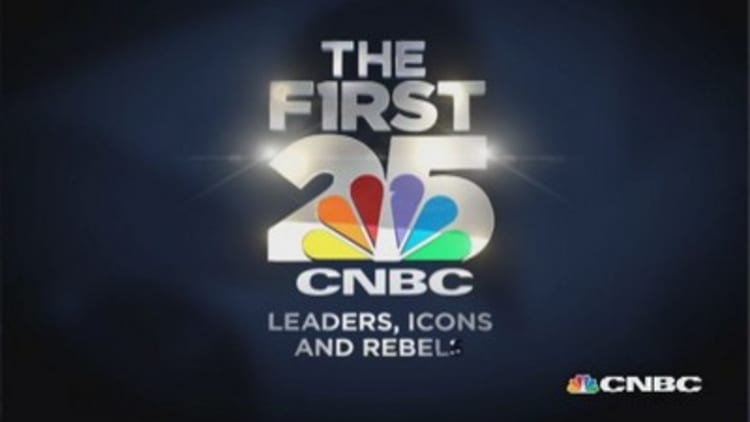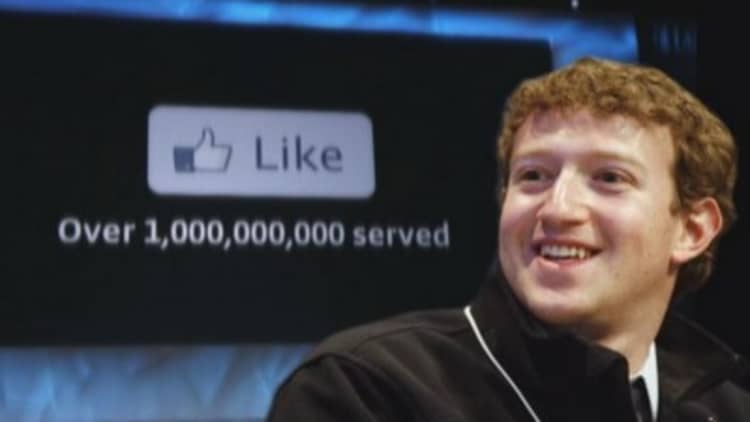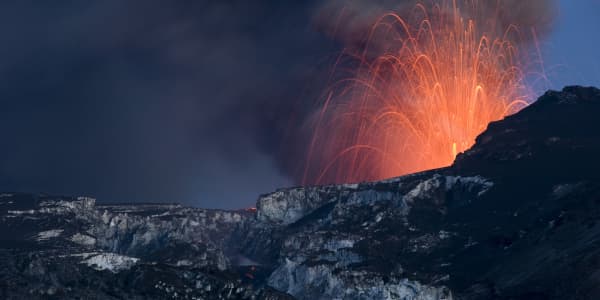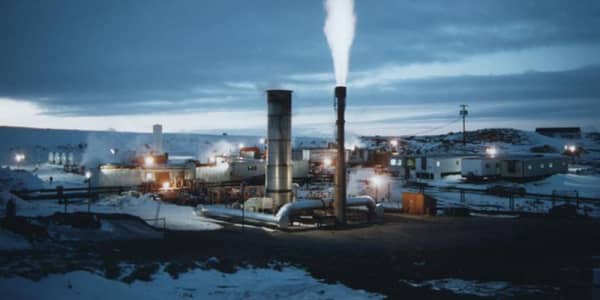In 1989, when CNBC launched, more than half of the 20 biggest companies in the world ranked by market value were based in Japan, versus less than a third in the United States. The U.S. still boasted the largest economy on earth, but many Americans were telling their children to learn Japanese so that they could speak to their expected new bosses.
In autos, steel, banking, brokerage, electronics and elsewhere, Japanese companies were on the march, seemingly poised to outcompete those in the rest of the world. A decade later, all that was a distant nightmare to Americans. Only two of the world's top 20 companies were based in Japan, and 14 were in the U.S.
Most Valuable Global Companies in 1989
| Click to edit | Company | Country | Full Market Cap (USD M) |
|---|---|---|---|
| 1 | Industrial Bank of Japan | Japan | 104,291.49 |
| 2 | Sumitomo Bank | Japan | 73,304.65 |
| 3 | Fuji Bank | Japan | 69,403.38 |
| 4 | Dai-Ichi Kangyo Bank | Japan | 64,036.45 |
| 5 | Exxon Corp | United States | 63,838.00 |
| 6 | General Electric USA | United States | 58,187 |
| 7 | Tokyo Electric Power | Japan | 56,499.62 |
| 8 | IBM Corp | United States | 55,656.99 |
| 9 | Toyota Motor Corp. | Japan | 53,251.22 |
| 10 | American Tel & Tel | United States | 48,951.00 |
| 11 | Nomura Securities | Japan | 46,810.74 |
| 12 | Royal Dutch Petroleum | Netherlands | 41,004.23 |
| 13 | Philip Morris Cos | United States | 38,581.99 |
| 14 | Nippon Steel | Japan | 36,586.72 |
| 15 | Tokai Bank | Japan | 35,346.51 |
| 16 | Mitsui Bank | Japan | 34,985.00 |
| 17 | Matsushita Elect Ind'l | Japan | 33,363.05 |
| 18 | Kansai Electric Power | Japan | 33,127.53 |
| 19 | Hitachi LTD | Japan | 32,212.65 |
| 20 | Merck & Co | United States | 30,747.00 |
Source: Source: MSCI
Today, Japan is recovering from a generation of limp growth, while American creativity and entrepreneurship have restored U.S. leadership in a number of fields, particularly the crucial domain of digital technology and its applications. China, not Japan, is the leading rival, and coming up fast.
That is just one illustration of how CNBC's first 25 years have encompassed a wild ride for the global economy and the companies and people engaged in it. It was a time when business and financial figures emerged from obscurity to rival movie actors and rock stars for celebrity. Young entrepreneurs became billionaires in a matter of years instead of many decades.
Bill Gates, a Harvard dropout, created Microsoft at 21 with a small team of chums, and outran IBM for the lead position in designing software for personal computers. By 1995, when he turned 40, he was the world's richest man.
Fired from securities firm Salomon Brothers, Michael Bloomberg designed an analytics system that allowed any broker to compare bond values quickly. Soon, the Bloomberg terminal, humming with thousands of pages of news, data and insight, was a must-have for Wall Street traders and bankers. Bloomberg became a multibillionaire and went onto a career in politics, elected three times as mayor of New York.

CNBC's first quarter-century also was a time when passionate entrepreneurs could burrow into the public's psyche to transform behavior in ways big and small.
From a four-store chain in Seattle, Howard Schultz's Starbucks spread around the world to change the way we consume, and value, coffee. Martha Stewart went from modeling (Chanel) to stockbroking before building herself from fledgling caterer and cookbook writer into America's billionaire arbiter of home furnishings and entertainment.
Oprah Winfrey emerged from an impoverished upbringing in Tennessee as a beauty queen and then as arguably the most potent personality on U.S. television; a kind word from her could turn a book into a bestseller. In Paris, Bernard Arnault relentlessly combined a host of the world's luxury brands into the LVMH conglomerate, along the way distilling a magic elixir of design, production and, above all, marketing to tempt wealthy consumers from every part of the globe to pay enormous sums for chic dresses, shoes and luggage.
Many industries experienced upheavals. Famous business names slipped, and some disappeared, while newcomers exploded onto the scene. The speed of transition could be dazzling.
Consider retailing. In "The Wal-Mart Effect," Charles Fishman cites a 1986 New York Times story that speculated that Kmart would overtake Sears as America's largest general-merchandise chain by the end of that decade. Wal-Mart, Fishman notes, was not mentioned in the story. "By the end of 1990," he writes, "Wal-Mart was bigger than Kmart. Two years later, Wal-Mart passed Sears. By the end of 1994, Wal-Mart was bigger than Sears and Kmart combined." Wal-Mart is now the world's fifth most valuable listed company and the second largest by sales.
In 1997, Apple Computer was near death as a stand-alone company. After big losses, it was on the block, its market value headed below $3 billion. But a series of possible merger deals fell through, and Apple stayed independent. It soon introduced the iPod music player and then the iTunes music store, selling most songs for the magic price of 99 cents and revolutionizing the business by making it easier for consumers to pay for music than to steal it. Changing the name from Apple Computer to simply Apple, CEO Steve Jobs unleashed a frenzy of product introductions, with a huge impact on the businesses of phones, casual photography and tablet computing. Today, the company's market capitalization has risen a hundredfold.
Most Valuable Global Companies in 1999
| Company | Country | Full Market Cap (USD M) | |
|---|---|---|---|
| 1 | Microsoft Corp | United States | 602,432.91 |
| 2 | General Electric Co | United States | 507,216.65 |
| 3 | Cisco Systems | United States | 357,112.00 |
| 4 | Wal-Mart Stores | United States | 307,518.25 |
| 5 | Exxon Mobil Corp | United States | 278,873.14 |
| 6 | Intel Corp | United States | 275,006.06 |
| 7 | NTT Corp | Japan | 272,053.15 |
| 8 | Lucent Technologies | United States | 227,989.65 |
| 9 | Nokia Corp | Finland | 218,986.95 |
| 10 | Deutsche Telekom | Germany | 216,074.51 |
| 11 | IBM Corp | United States | 195,775.43 |
| 12 | BP Amoco | United Kingdom | 195,624.14 |
| 13 | Citigroup | United States | 187,759.59 |
| 14 | Toyota Motor Corp | Japan | 182,040.49 |
| 15 | America Online | United States | 169,617.50 |
| 16 | American Int'l Group | United States | 167,403.63 |
| 17 | SBC Communications | United States | 166,304.72 |
| 18 | AT&T Corp | United States | 162,380.38 |
| 19 | Oracle Corp | United States | 159,540.24 |
| 20 | British Telecom | United Kingdom | 157,757.28 |
Source: Source: MSCI
It is a given that ExxonMobil in any year will be among the world's five biggest companies and Chevron in the top 20, but that doesn't mean they don't have to work for it. In two of the largest mergers ever, Exxon acquired Mobil in 1999 and Chevron acquired Texaco a year later. Both companies recently made multibillion-dollar investments in the rapidly growing field of hydraulic fracturing, or fracking. Smaller oil and gas independents—notably Texas wildcatter George P. Mitchell's Mitchell Energy— figured out how to apply this old technology to the new task of squeezing large quantities of natural gas out of previously inaccessible shale formations. The technique promises to turn the U.S. from a substantial hydrocarbon importer to an exporter of some significance.
Provided, that is, that a way can be found to ensure that the threat posed by fracking to drinking water and the atmosphere is controlled, along with a small but growing movement among environmentalists to force divestment of oil stocks by universities, foundations and churches. They argue that capital must be shifted to renewables and conservation to restrain global warming.
In 1999, two Stanford graduate students, Sergey Brin and Larry Page, launched a beta version of their Google search engine—and ignited a revolution in the public's access to information. Instead of buying newspapers and magazines and going to the library, people needed only to use a computer connected to the Internet. Now a smartphone suffices. From its origins in Brin and Page's dorm rooms and then in a rented garage, Google has grown to be one of the three biggest companies in the world.
Most Valuable Global Companies in 2009
| Company | Country | Full Market Cap (USD M) | |
|---|---|---|---|
| 1 | Exxon Mobil Corp | United States | 327,706.82 |
| 2 | Microsoft Corp | United States | 271,686.45 |
| 3 | Wal-Mart Stores | United States | 208,274.23 |
| 4 | HSBC Holdings (GB) | United Kingdom | 198,448.37 |
| 5 | China Construction BK H | China | 193,276.57 |
| 6 | Apple | United States | 188,891.97 |
| 7 | China Mobile | China | 188,464.99 |
| 8 | BP | United Kingdom | 181,615.46 |
| 9 | Johnson & Johnson | United States | 177,501.98 |
| 10 | Nestle | Switzerland | 177,247.88 |
| 11 | Procter & Gamble Co | United States | 176,979.27 |
| 12 | IBM Corp | United States | 171,594.72 |
| 13 | AT&T | United States | 165,377 |
| 14 | JPMorgan Chase & Co | United States | 163,870.32 |
| 15 | General Electric Co | United States | 160,784.12 |
| 16 | Chevron Corp | United States | 154,404.45 |
| 17 | Total | France | 151,548.48 |
| 18 | Google A | United States | 150,017.80 |
| 19 | Pfizer | United States | 146,687.33 |
| 20 | Novartis | Switzerland | 144,160.29 |
Source: Source: MSCI
More broadly, the media, entertainment and telecommunications industries underwent an interlinked transformation during CNBC's first 25 years, particularly in the U.S. The monopoly that the old AT&T had held over local and long-distance telephone service and equipment had been broken up by court order in 1984, unleashing decades of dramatic change. Over time, divergent technologies—cable and satellite for video and underground or wireless transmission for telephone—converged, and the participating companies embarked on a chain of mergers.
Today, more and more consumers get video, computer and telephone service from a single company, including Verizon, formed by mergers of several of the old AT&T's regional Baby Bell companies, and Comcast, the product of many acquisitions of cable distributors. Assuming its proposed acquisition of Time Warner's giant network of cable systems isn't blocked at the last minute by federal antitrust concerns, Comcast or Verizon will dominate cable, video and Internet access for majorities of residents in many metro areas. Critics fear that one or both of these companies will be able to exert excessive influence on pricing and content in a large and growing share of the American marketplace. (Comcast sought control of NBCUniversal in 2009, consummated the deal in 2011, and thus also owns multiple TV and cable networks, including CNBC.)
Not all the dramatic changes in business in the last 25 years have been on the upside, of course.
Take the airline industry. Three of the five biggest airlines of a generation ago have disappeared in the CNBC era: Pan American World Airways and Eastern Air Lines in 1991, and Trans World Airlines, known as TWA, in 2001. United Airlines merged with Continental Airlines in 2010, and American Airlines with US Airways just last year. All were caught in the turbulence generated when the industry was deregulated beginning in the 1970s. Carriers no longer had to get government permission to change routes or prices. The result was, for passengers, cheaper fares, but less-pleasant accommodations (welcome to the middle seat) and, for the airlines, persistent economic vulnerability.
The big-box music store, a fixture of U.S. popular culture for decades, all but disappeared, too, and the video rental headed in the same direction, as electronic distribution displaced neighborhood retailing and mailer envelopes. HMV closed its doors in 2004, Tower Records in 2006, Sam Goody in 2007 and Virgin Megastores, a brainchild of British entrepreneur Richard Branson, in 2009.
Seismic geopolitical shifts have accompanied the economic and business changes of the past 25 years. Soon after CNBC's launch, the long Cold War came to an end, as in the early 1990s the Soviet Union collapsed, East and West Germany reunited, and many former satellite states rejected Communism. And yet, in 1991, Americans found themselves fighting the first of four significant shooting wars. Two—in Kuwait and the Balkans—were swiftly brought to a relatively successful conclusion; the other two—in Iraq and Afghanistan—have produced long ordeals whose outcomes are still fully to unfold.
The Iraq and Afghanistan conflicts were primarily an outcome of 9/11, the largest assaults on American soil since Pearl Harbor 60 years earlier. Besides their searing emotional impact, the attacks provoked a diversion of resources into military and intelligence capabilities—a redirection whose economic and financial effects still aren't fully understood. It may be more than symbolic that only now, nearly 13 years later, has the former site of the World Trade Center's twin towers begun to look once again like a gleaming urban plaza instead of a disaster zone.
The first 15 years of CNBC's life were relatively uneventful economically, with two notable bubbles (in the dot-com space in the late 1990s and mortgage finance in the early 2000s) and two minor recessions (1990-91 and 2001). But then came a financial crash and the accompanying Great Recession (2007-09), which unleashed havoc around the world.
The financial meltdown had many causes. Clear contributors were world monetary authorities, led by the Federal Reserve, which pushed down interest rates too far and for too long in an effort to sustain economic growth amid calm inflation. Another wellspring was the rampant excess of the world's financiers. Set loose by global financial liberalization, they turned the capital markets into casinos, with exotic derivative securities that almost no one understood, and computerized trading strategies that made for big fees, profits and bonuses for the bankers. The result was to put the financial markets at the brink of total collapse after central bankers ultimately and inevitably tightened the supply of new credit.
It took massive intervention in late 2008 and early 2009 by the Fed, Treasury, White House and Congress—one of the rare examples of significant U.S. bipartisanship in recent years—to prevent the calamity from becoming a global cataclysm on a scale approaching the Great Depression of the 1930s. The government shelled out hundreds of billions of dollars in bailouts to banks and other financial institutions, and hundreds of billions more in tax cuts and infrastructure spending to shock the moribund economy back to life. It also guaranteed emergency support for commercial paper and money market mutual funds.
The hall of shame of mismanaged banks that fell into bankruptcy or forced mergers included Richard Fuld's Lehman Brothers, Stanley O'Neal's Merrill Lynch and Jimmy Cayne's Bear Stearns. The biggest beached whale of all, the insurance conglomerate American International Group, was refloated in the nick of time in September 2008 by an $85 billion federal bailout. Government officials worried that if AIG couldn't pay off its debts to other stressed financial firms in the U.S. and abroad, including bellwether investment bank Goldman Sachs, the industrial world's financial underpinnings could buckle.
The resulting economic recovery, though painfully slow, has been steady in the U.S., and notably faster than in Europe, aided by aggressive money-printing by the Federal Reserve. With short-term interest rates across the rich world at or near zero, Europe has recently flirted with adopting the Fed's controversial quantitative easing: the buying of long-term debt to keep long-term rates low and make more funding available for investment.
The stock market during CNBC's first quarter-century has followed a pattern somewhat akin to that of the economy, except that the recovery in stock prices after their 2008 plunge has been much faster than that of the economy overall. This decade, they have set new records. Even usually placid Treasury bonds have had periods of spectacular movement, although in recent years rates have stayed relentlessly low—good for loan-seeking businesses but painful for retirees and others on fixed incomes.
As CNBC began airing 25 springs ago, there was little portent of the market drama that was to come.
Federal prosecutors had just indicted Michael Milken on charges of racketeering and securities fraud. For years Milken, of investment firm Drexel Burnham Lambert, had used his dominance of the junk bond market to mobilize huge sums to back takeovers he favored. Now that he was going to be defending himself (he ultimately went to prison), some felt that mergers and acquisition activity would slow, easing upward pressure on stock prices that had risen impressively in the previous seven years.
Private equity seemed to be sidelined. Its most dominant manifestation of the 1980s, the leveraged buyout—typically involving the takeover of mature companies by using large amounts of debt to buy up their stock—was running into trouble.
Recounted in stirring detail in perhaps the most famous business book of the last 50 years, Barbarians at the Gate, the battle to take over aging consumer-goods conglomerate RJR Nabisco involved several of Wall Street's biggest banks in addition to the reigning LBO kings at Kohlberg Kravis & Roberts. KKR's winning bid in 1989, valued at the then-hysterical level of $31.1 billion, left the victors temporarily strutting but ultimately losing hundreds of millions of dollars. This was followed by the failure of another big deal, investor Robert Campeau's Federated Department Stores, a roll-up of well-known retail chains.
The wound licking lasted only a few years. Private equity took off again. Firms formed in the 1980s such as Texas Pacific Group (now TPG Capital), Carlyle Group, Blackstone Group and Bain Capital infused new energy into the movement. With inflation fears diminished, the Federal Reserve made money readily available. LBOs assumed a less important (though still significant) role, in favor of other forms of private equity investment, such as venture capital, which targeted new or emerging companies. An assembly line of start-ups, many in Silicon Valley, began marching from launch to initial public offering, making multimillionaires and beyond out of kids in hoodies as well as their bankers.

The process was disrupted by the dot-com crash of 2000-01 and the broader financial collapse later in the decade, but only briefly. What may turn out to be the most significant of these start-ups, Facebook, was launched in 2004 by Mark Zuckerberg and a couple of his Harvard friends. Initially it gave students at the university a seamless way to connect with each other, and in short order allowed almost anyone to connect with almost anyone else in the world. Facebook became the centerpiece of a cultural and business phenomenon known as social media, built around it and other emerging companies such as Twitter and LinkedIn.
Just this spring, Jan Koum, who immigrated to America from Ukraine 20 years ago, sold his WhatsApp messaging start-up to Facebook and got what Forbes magazine calculates as $6.8 billion after taxes for his share. That is either a new milestone in the Internet age or an exclamation point on the announcement that we are back in a bubble. In either case, it is certainly one fitting endpoint for CNBC's first 25 years.
Most Valuable Global Companies in 2014
| Company | Country | Full Market Cap (USD M) | |
|---|---|---|---|
| 1 | Apple | United States | 478,381.70 |
| 2 | Exxon Mobil Corp | United States | 438,467.73 |
| 3 | Microsoft Corp | United States | 333,835.24 |
| 4 | Google A +C Share | United States | 298,945.20 |
| 5 | Johnson & Johnson | United States | 282,651.66 |
| 6 | General Electric Co | United States | 268,919.66 |
| 7 | Wells Fargo & Co | United States | 259,323.88 |
| 8 | Wal-Mart Stores | United States | 252,493.18 |
| 9 | Nestle | Switzerland | 244,700.27 |
| 10 | Chevron Corp | United States | 238,473.45 |
| 11 | Novartis | Switzerland | 233,461.09 |
| 12 | Procter & Gamble Co | United States | 220,856.25 |
| 13 | JPMorgan Chase & Co | United States | 209,800.34 |
| 14 | IBM Corp | United States | 208,646.92 |
| 15 | Roche Holding Geniuss | Switzerland | 203,724.14 |
| 16 | Pfizer | United States | 200,913.20 |
| 17 | Verizon Communications | United States | 198,130.19 |
| 18 | Samsung Electronics Co | Korea | 195,197.17 |
| 19 | HSBC Holdings (GB) | United Kingdom | 193,949.21 |
| 20 | AT&T | United States | 191,175.72 |
Source: Source: MSCI
Today, as CNBC embarks on its second quarter-century, it faces a very different world from when it started. The U.S. economy, business and markets are increasingly dominated by technology, media and entertainment, health care, and finance—all in the midst of significant transition. Manufacturing has continued to move to China and other emerging nations such as India, Brazil and Thailand.
No longer is this migration mainly a function of cheap, unskilled labor or artificially low exchange rates. Emerging economies are developing significant value-added manufacturing and process innovation, particularly the ability to mobilize large numbers of engineers and other key workers to design, build and launch high-speed product assembly facilities. They are also becoming consequential consumer markets in their own right. While still well behind on a per-capita basis, emerging markets now account for more than half of global GDP measured by purchasing power parity.
As in a similar period of great economic transition—America's Gilded Age of the late 19th century—CNBC's life reflects the building of great fortunes amid growing inequality. In the U.S., the Gilded Age was followed by an upsurge of government regulation and trust-busting. Some yearn for a similar reaction now, while others view such a prospect with horror. Stay tuned.
— By Paul E. Steiger, Special to CNBC
Paul E. Steiger is ProPublica's board of directors' executive chairman. Steiger was the founding editor-in-chief, CEO and president of ProPublica from 2008 through 2012. As executive chairman, Steiger remains actively involved in strategic issues, development, representing ProPublica in public venues and consulting with management on business and editorial issues as needed and on a part-time basis. Previously, Steiger served as the managing editor of the Wall Street Journal from 1991 to 2007. During his tenure, members of the Journal's newsroom staff were awarded 16 Pulitzer Prizes. In addition, ProPublica reporters received Pulitzer Prizes in 2010 and 2011. Steiger is currently serving as part of the CNBC 25 advisory board.
Clarification: This story has been updated to reflect Comcast's control of NBCUniversal in 2011.









